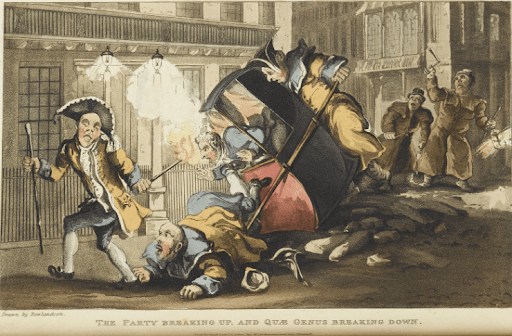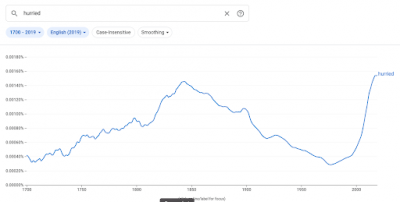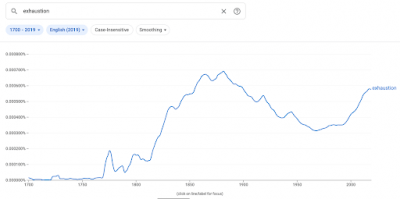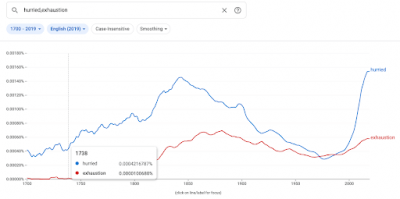
Hurried: We’ve been here before
21st Apr 2022
We live in an age of velocity of thought and action. Our brains process more in a month than our ancestors did in their lifetimes.
Sound familiar? You could be forgiven for thinking that it’s a modern day quote. In fact, it comes from a 19th century medical practitioner.
Hurried. We’ve been here before.
Google’s Ngram Viewer is a cool way to unearth and highlight trends in the use of language over time. Here’s what I discovered when I entered the word ‘hurried’:

One way I make sense of this is to reflect on what was happening back in the 1800’s.
Around the 1820’s, the use of the word ‘Hurried’ started to rise, and peaked around 1840. This correlates with the acceleration and height of the industrial revolution in Europe. As technology began to drive new ways of working and living, people scrambled to adapt and keep up. They felt more hurried, and they said that they did.
Back then, society experienced a similar magnitude of upheaval as we’re experiencing today. In particular, the rise of new technologies transformed people’s understanding of time and space like never before. The invention of the telegraph gave people the opportunity to connect with people instantaneously, whereas previously communication would have taken days if not weeks to occur. The rise of factories as a primary place of work shifted how we thought about time, and its relationship to money. Within a matter of a few decades, society had transformed. And we became more hurried than ever.
Citizens of the United Kingdom complained of overwork and information overload. As the industrial revolution took hold, the perceived pace of life increased, and with it came the recognition of the psychological impact that it had.
Where else do you see the upswing in this picture? In the early 1990’s. Right about the time the internet was taking off.
Here’s something else interesting: if you track the use of the word ‘Exhaustion’ over the same time-scale, this is what you get:

During the industrial revolution, the exhaustion peak was between the mid 1860’s to the mid 1880’s. That’s 20-40 years after the hurriedness peak.
See how exhaustion is on the rise again from the early 2000’s? We’ve been feeling hurried for a while, but now we’re starting to get exhausted.
When we compare the two pictures, this is what we see:

There’s a time lag between our peak hurriedness and our peak exhaustion.
First we hurry, then we get exhausted. When societal change happens, we start by simply running harder and faster to keep pace with those changes.
It’s a bit like loading up your old laptop with more and more apps. Unless you upgrade the system, it will eventually crash.
What does an upgrade look like in our modern day context?
I reckon we’re seeing it with the Great Resignation. I noticed a LinkedIn post earlier this week (I wish I could find it again) with an anecdote about how many more people are posting that they’ve started a new job recently. More of us are reflecting, and acting, on what matters most.
McKinsey recently published research which highlights that the reason that people are leaving is not because of poor pay or lack of development opportunities. They’re leaving because they don’t feel valued by their manager or their organisation. They want a sense of meaningful connection to people and purpose in ways that enable them to be at their best.
People want to dial down rushing around working on things that don’t matter, and dial up investing in the things that do.
As you read in my post last week, and as I point out in my model on Unhurried Productivity, exhaustion leads to reflection, which leads to ideation and new action. This is what we’re seeing now en masse.
This is a time for all of us to reflect on, act on, and create the conditions for what matters most.
Like this post? When you’re ready, here are three ways I can help you further:
- Sign up to my ‘Thinking from the Edge’ newsletter to get tips, insights and early release information that I don’t share on the usual social channels. Delivered weekly to your inbox.
- Get my book, Change Makers: How to make your mark with more impact and less drama. It’s available here.
- Check out Change Makers Kick Start – an online course + community to help you make your mark with more impact and less drama.

